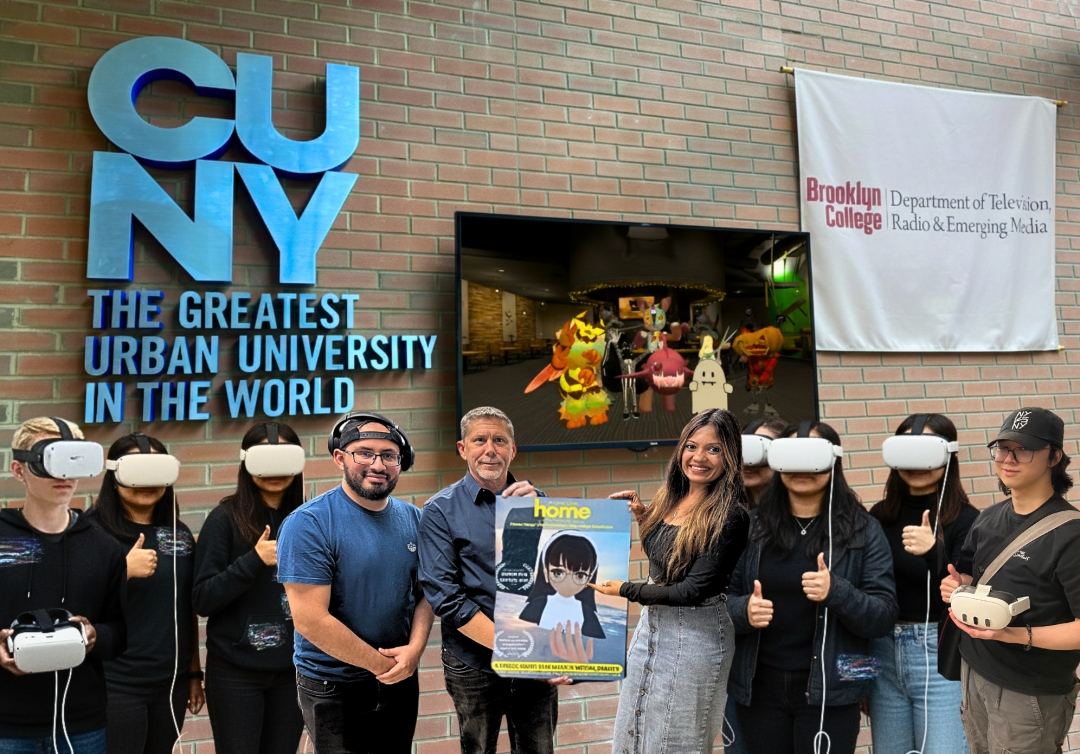NEW YORK, NY - Home, a contemplative virtual reality short film by Indian filmmaker and City University of New York (CUNY) student Neha Lohia, has been officially selected for the 2025 edition of the Jagran Film Festival, India’s leading traveling film festival spanning 13+ cities.
Originally created as part of CUNY Brooklyn College’s “VR in Storytelling” course, Home is a poetic exploration of a woman’s quiet escape from religious structures—inviting viewers to consider the deeper truth that women cannot be fully free without spiritual and religious freedom. The film was previously honored with the Creative Achievement Award at the CUNY CSI Film Festival (March 2025) and is Lohia’s first foray into immersive filmmaking.
“This was the first VR film I’ve ever made,” said Lohia. “I wanted to see if a story this intimate—one that lives so deeply inside a person—could be experienced just as intimately by someone else. VR allowed us to invite the viewer into that inner personal space and feel it — to be a part of it, not just see it as a spectator or outsider. It's visceral, and offers something I always wanted to deliver: an experience.
Home was created entirely in VRChat, using minimal external resources and a small team of international student collaborators, including Melissa Vitrago, Gideon Hagley, and Patrick Leon, under the mentorship of Professor Jason Moore, a pioneer in immersive media whose revolutionary film Alien Rescue allows viewers to step inside the film as live characters and change the outcome of the story.
“VR may still be young, but it’s already proving itself as a profoundly intimate and transformative vessel for storytelling,” said Professor Jason Moore. “What Neha and her peers are achieving shows that you don’t need a massive budget to create powerful, resonant stories. This medium holds untapped potential to carry universal narratives — from anywhere in the world — into the hearts of audiences in deeply personal ways. VR is not just tech — it’s a vessel for emotional intimacy”.
Told without spoken dialogue and driven by the rhythm of a poetic voiceover, Home invites the viewer to become emotionally immersed in the protagonist’s journey. The film is both a personal narrative and a quiet experiment in merging emerging media with ancient spiritual themes.
“Telling a story in a medium that’s still finding its voice is both a challenge and a privilege,” says Neha Lohia. "Our focus was not on grand spectacle, but on quiet immersion. I’m deeply grateful to Jagran Film Festival for recognizing the heart of this work and embracing a new format with such openness. This welcoming support is not just an acceptance of this one film — it’s a meaningful encouragement for every emerging creator exploring new frontiers of expression and storytelling.”
Its selection by Jagran Film Festival comes at a time when immersive technology is gaining momentum in India, with increasing interest in VR for education, entertainment, and wellness applications. With domestic giants like Reliance Jio launching consumer headsets and global players like Meta, Apple, and Ray-Ban entering the Indian market, the timing is apt for homegrown experiments in virtual storytelling to be seen and celebrated.
“India has always been a civilization of storytelling,” said Professor Moore. “Now it’s also becoming a frontier for immersive formats like VR. This selection reflects a readiness to embrace those possibilities.”
Home was produced with a low carbon footprint and minimal equipment, aligning with sustainability practices. Lohia’s previous short film “Hello Dad” starring Emmy nominated actor Tirlok Malik and Swiss actress Ankita Makwana received the EMA Green Seal Award from the Environmental Media Association for sustainable filmmaking earlier this year.
VR offers a democratic platform for creators. Home stands as a testament to this potential, showing that with a heartfelt story, an international team can create a project that connects across borders and cultures.
About Neha Lohia
Neha Lohia is a New York–based Indian filmmaker with over two decades of experience across Bollywood, Hollywood, and global advertising. Currently pursuing immersive storytelling studies at CUNY, her work weaves together consciousness, spirituality, and emerging technologies to explore soulful, transformative narratives. Her short film Yashodhara: The Buddha’s Wife received a Special Festival Mention at the Dadasaheb Phalke Film Festival, and her recent film Hello Dad earned the EMA Green Seal for sustainable filmmaking, alongside other international and academic honors. Whether through traditional cinema or new media like VR, Lohia’s films reflect a commitment to telling soulful stories that heal, elevate, and resonate across evolving formats.
Website:www.nehalohia.com
Media Contact
Company Name: FIlm With Her
Email:Send Email
City: New York
State: New York
Country: United States
Website: www.nehalohia.com

